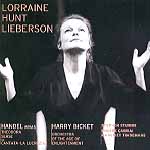Some years from now, observers of vocal music trends likely will look back on the early 21st century as the age of the mezzo and alto (and, similarly, the countertenor). It seems we’re enjoying a wealth of exceptional singers in vocal categories usually relegated to subordinate status in opera–but fortunately that also own some of the most glorious music in the vocal repertoire. Handel certainly didn’t hold back in writing for mezzo-range voices, offering music not only of beautiful melody but of considerable dramatic scope as well, and here mezzo Lorraine Hunt Lieberson lavishes on her listeners a well-chosen selection of rarely heard arias and a fine, characterful renditon of the Italian cantata La Lucrezia.
Throughout, Lieberson shows a comfortable, easy command of style, giving personality to each aria that gives us a sense of situation and character even in this out-of-context setting. From the very first lines of her opening recitative “Ah! Whither should we fly…?”–strong, full-toned, clear, and believably (not artificially) expressive–we’re drawn into her performance. And the following aria, “As with rosy steps” (one of Handel’s masterpieces), supported by undulating strings, perfectly describes the advancing, hopeful morning–and Lieberson’s sensitively sculpted rendition of text and melody is as lovely as we’ll likely ever hear.
My favorite La Lucrezia remains the one by Magdalena Kožená (type Q3027 in Search Reviews)–her characterization is simply more captivating, her vocalism just that much more assured–but this one is equally worthy in its slightly more restrained approach. Lieberson doesn’t seem as free in the fastest passages (the aria “Il suol che preme…”, for example)–in fact, the quick runs sound cautious rather than confident–but overall her portrayal is wonderful and rightly imagined. She also receives terrific support from her accompanists–including Stephen Stubbs (lute and guitar), Phoebe Carrai (cello), and Margriet Tindemans (gamba)–and benefits from sympathetic leadership by Harry Bicket (who also plays harpsichord). There’s some great music-making here–and some really fine arias that will please Handel fans. Lieberson’s five Theodora arias are exceptional; her concluding “Ombra mai fù” from Serse is a gem. The sound is slightly dry but crisp and clear and well balanced.
































